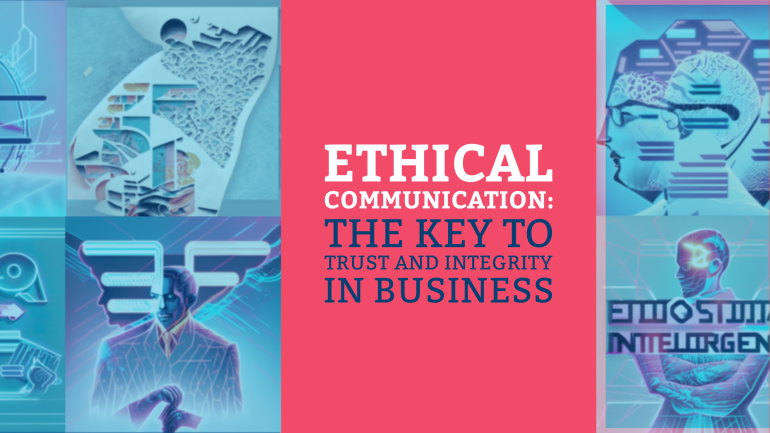Table of Contents
TL;DR: The Vital Role of Ethical Communication in Business
- Ethical Communication is Fundamental: Ensures integrity and transparency, fostering trust across all business relationships.
- Builds Stakeholder Trust: Transparent communication practices cultivate deep trust between businesses and their stakeholders.
- Enhances Brand Reputation: A commitment to ethical communication significantly boosts a company’s public image and credibility.
- Differentiates from Competitors: Businesses that prioritize ethical communication stand out in a marketplace often skeptical of corporate motives.
Introduction
In the interconnected maze of today’s business environment, ethical communication stands as a beacon of trust and integrity. It’s the lifeline that connects businesses with their stakeholders in a meaningful way, fostering relationships built on the solid ground of mutual respect and honesty. This guide embarks on a journey to dissect the essence of ethical communication, showcasing its pivotal role in nurturing a transparent, trustworthy, and ethical business world.
What is Ethical Communication?
Definition and Core Principles: Ethical communication is defined as the practice of exchanging information in a manner that is truthful, accurate, and respectful of others. It encompasses a range of core principles including honesty, integrity, fairness, and respect. These principles serve as the foundation for all forms of business communication, from internal memos to public advertising.
Ethical Communication vs. Profit-driven Communication: Unlike profit-driven communication, which prioritizes financial gains often at the expense of truthfulness and integrity, ethical communication values transparency and accountability above all. It seeks to balance the business’s objectives with the welfare of its stakeholders and the broader community, ensuring that messages are not only persuasive but also principled.
The Role of Ethical Communication in Business Success
Building Trust with Stakeholders: Trust is the currency of effective business relationships. Ethical communication fosters trust by ensuring that stakeholders — be they employees, customers, investors, or the community at large — can rely on the business to share information that is truthful and complete. This trust, once established, becomes a powerful driver of loyalty and long-term engagement.

Enhancing Brand Reputation: In an era where reputation can be built or broken in the click of a button, ethical communication acts as a safeguard, protecting and enhancing a company’s image. By consistently adhering to ethical communication standards, businesses not only avoid potential scandals but also position themselves as industry leaders who prioritize integrity over immediate gains. This commitment to ethics becomes part of the brand’s identity, attracting customers and partners who share similar values.
Ethical Dilemmas in Business Communication
Common Scenarios and Challenges
In the fast-paced realm of business, communication often treads a thin line between persuasion and manipulation, transparency and discretion. Ethical dilemmas arise when these lines blur, posing significant challenges for business managers. For instance, consider the scenario where market pressures demand a positive spin on a product’s marginal performance, or when competitive intelligence teeters on the edge of corporate espionage.
Strategies for Navigating Ethical Dilemmas
Navigating these waters requires a principled approach, grounded in core values of honesty, respect, and responsibility.
- Honesty: Always aim for truthful communication, even when the information is unfavorable. This builds credibility and trust over time, forming a solid foundation for lasting stakeholder relationships.
- Respect: Acknowledge the autonomy and rights of all parties involved. This includes respecting privacy, confidentiality, and the right to informed decision-making. For instance, when dealing with sensitive employee data, utmost care should be taken to safeguard personal information, only sharing what is necessary and with consent.
- Responsibility: Recognize the impact of your communication on others. Before disseminating information, consider the potential effects on employees, customers, and the wider community. For example, when faced with a product recall, prioritize the well-being of consumers in your communication strategy, focusing on immediate and transparent information sharing to mitigate risks.
Practical Tips:
- Develop a Clear Code of Ethics: Establish clear guidelines for what constitutes ethical communication within your organization. This provides a reference point for decision-making and helps ensure consistency in messaging.
- Foster an Open Culture: Encourage open discussions about ethical dilemmas and how they should be handled. Creating an environment where employees feel comfortable raising concerns and discussing potential ethical issues can preempt many problems.
- Provide Training: Equip your team with the tools they need to identify and navigate ethical dilemmas. Regular training sessions on ethical communication can help reinforce the importance of integrity and transparency.
- Lead by Example: As a leader, your actions set the tone for the organization. Demonstrate ethical communication in your interactions, and you’ll inspire your team to follow suit.
The Impact of Technology on Ethical Communication
The digital age has transformed how we communicate, bringing both opportunities and challenges to ethical communication.
Digital Platforms and Transparency: Digital platforms have democratized information dissemination, allowing businesses to reach a global audience instantly. However, this comes with the responsibility to ensure that the information shared is accurate, transparent, and does not mislead. In an era where fake news can spread just as fast as truthful information, maintaining transparency is crucial for upholding the trust of stakeholders.
Maintaining Privacy and Confidentiality Online: As more personal and sensitive information is shared online, businesses must prioritize protecting this data. Ethical communication involves not only respecting privacy laws but also going beyond legal requirements to treat customer data with the utmost care, reflecting the values of respect and responsibility.
Implementing Ethical Communication Strategies
To foster ethical communication, businesses need structured strategies that are integrated into their culture and processes.
Training and Awareness Programs: Regular training sessions should be conducted to keep all members of the organization informed about the principles of ethical communication and how they can be applied in daily operations. These programs can also include scenario-based learning to help employees navigate complex ethical dilemmas.
Creating an Ethical Communication Policy: A clear policy that outlines the dos and don’ts of communication within and outside the organization can serve as a guideline for maintaining ethical standards. This policy should be accessible to everyone and updated regularly to reflect any changes in legal requirements or business practices.
Case Studies: Ethical Communication in Action
Success Stories from the Corporate World: Highlighting case studies of businesses that have successfully implemented ethical communication can offer valuable lessons. For instance, a company that openly addressed a product failure and took immediate corrective action can demonstrate the positive impact of transparency on brand reputation.
Lessons Learned from Ethical Breaches: Conversely, examining instances where businesses failed to maintain ethical communication can serve as cautionary tales. Analyzing the fallout from such breaches and the steps taken to recover can provide insights into the importance of ethical practices.
The Future of Ethical Communication in Business
As we look ahead, ethical communication will continue to evolve alongside technological advancements and societal changes.
Emerging Trends and Predictions: The increasing use of data analytics and personalized marketing raises new ethical considerations about privacy and consent. Businesses will need to navigate these issues carefully to maintain trust and credibility.
The Role of AI and Ethics in Communication: The integration of AI in communication tools offers potential efficiencies but also poses ethical questions, particularly around transparency and accountability. Ensuring that AI-enhanced communication adheres to ethical standards will be a significant focus for businesses.
Overcoming Barriers to Ethical Communication
Organizational Culture and Resistance: Changing an established culture to prioritize ethical communication can encounter resistance. Leadership commitment and clear communication of the benefits can help overcome such barriers.
Ensuring Consistency Across Global Operations: For multinational companies, maintaining consistent ethical communication across diverse cultural and regulatory environments can be challenging. A strong central policy, combined with local adaptations, can help achieve this balance.
Conclusion
Ethical communication is not just a moral obligation but a strategic asset that enhances trust, strengthens relationships, and builds a reputable brand. By recognizing the common dilemmas and employing strategies to navigate these challenges, business managers can ensure their communication practices reflect their core values and contribute to sustainable business success.
FAQs
1. What are the first steps to implementing ethical communication in my business?
Start by defining your core ethical principles and developing a communication policy that reflects these values.
2. How can businesses balance ethical communication with competitive marketing?
Focus on transparency and authenticity in your marketing efforts. Highlighting real benefits and differentiators can be compelling without resorting to unethical exaggeration.
3. What role do leaders play in ethical communication?
Leaders set the tone for the organization’s communication culture. Leading by example and actively promoting ethical practices are key.
4. How can a company recover from an ethical communication breach?
Immediate transparency, accountability, and a clear plan to prevent future breaches are essential steps towards recovery.
5. Can ethical communication improve employee morale and retention?
Absolutely. A culture of honesty and respect fosters a positive work environment, enhancing employee satisfaction and loyalty.





